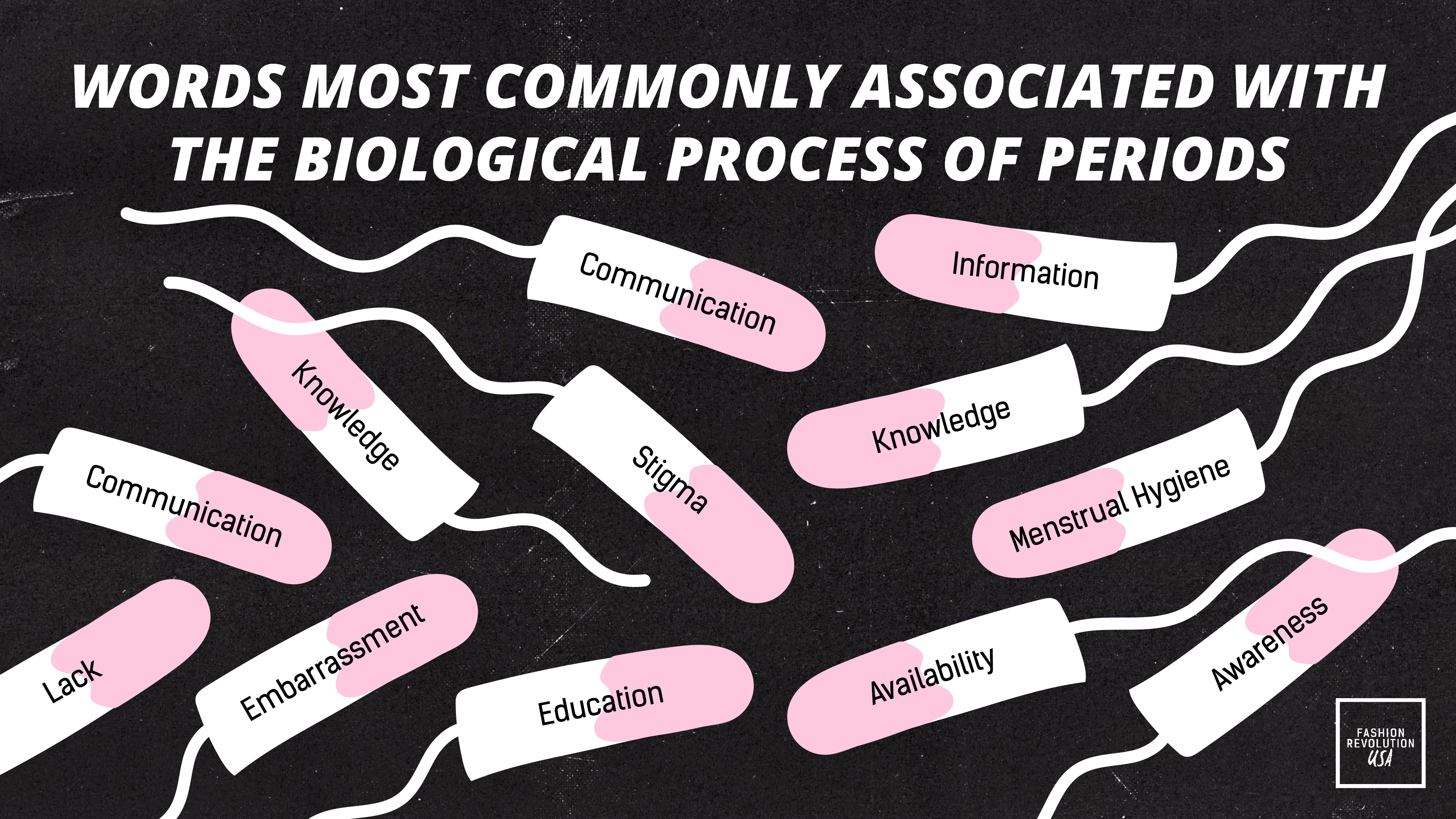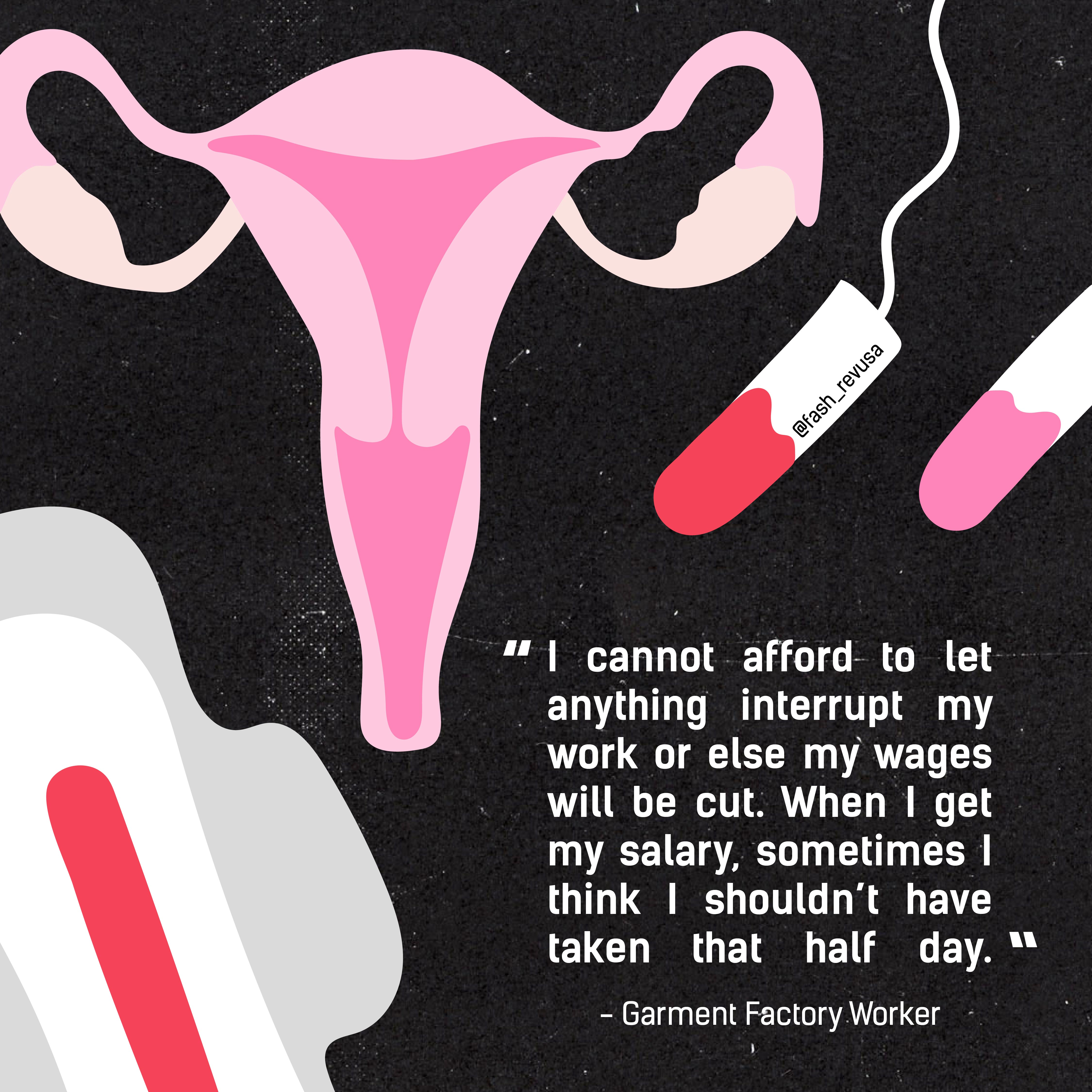Fashionable Flow: Menstrual Hygiene of Garment Workers in India
By Prachi Gor
Have you recently bought a $4 top? We have learned over the past few years that the fast fashion industry is not so transparent when it comes to garment workers’ conditions. But, we seldom imagine that those low-priced garments we buy might not be allowing women workers to take care of their basic menstrual hygiene.
The global fashion industry relies on a complex supply chain that includes a large amount of human capital at its start, largely consisting of women in third world countries. Such is the case in the country I come from, India. The ready-made garment sector directly employs 12.9 million individuals in formal factory settings. Approximately 80 percent of these garment workers are women. Still wondering how this relates to menstruation?
Here’s a backstory: One of the first ways to ‘deal’ with menstrual blood was ‘cloth bandages’. But even today, the majority of women in India are stuck with this ‘cloth’ and menstrual stigma, due to lack of access, education and policies. Because menstruation continues to be a taboo topic, women aren’t aware of the long-term effects of improper menstrual hygiene management. One example is a case where a rag was used by a young girl to tend to her periods. She wasn’t aware that a lizard had used this rag to lay eggs, and this led to an infection in her uterus, needing to be surgically removed. Examples mount: another 7th grader committed suicide for being shamed for period stains by her teacher, and a woman had to have her cervix removed due to an infection caused by a rusted hook on a cloth rag that she used to hide period blood.

Even today, women in garment factories resort to rags lying around rather than spending their hard-earned money on buying sanitary napkins. Many of these women belong to lower socio-economic classes where the worries of basic food and shelter loom large over their heads. They are often paid as little as 15 cents an hour as they toil their days away in harsh conditions to make ends meet. A UNICEF study cited most women report not using sanitary napkins due to the high cost (80%). Followed by a lack of awareness (19%). Therefore, their health and sanitation can’t be left completely to them, nor is it completely in their hands.

There is a strong connection between menstruation, women, and fashion’s complex supply chain. The rise of global consumption of fast fashion with 52 seasons a year has led to a massive increase in the production of new garments every year. With demand going up in the western world, the product prices goes drastically down. This puts all the pressure on cheap labor in third world countries for better prices. In the end, these clothes are highly disposable, and their low prices imply that they are not meant to be valued — just like the cheap labor working on these clothes. A Reuters study conducted across garment factories in South India found that women workers were doled out unlabelled pills when they complained of menstrual cramps. These units had ‘timekeepers’ that denied leaves and bathroom breaks as the priority was always production. Some women even faced harassment for lesser productivity. Additionally, under Indian Labor Laws, factories must have one toilet for every 20 workers but that is rarely the case across the country, auditors said. Despite being the world’s second-largest manufacturer of textiles and garments after China, the country struggles to deal with the health issues of the industry’s driving workforce.
The point is to talk about the issue of period poverty with respect to garment workers and what role do brands play in it?!
These garments workers don’t have time or resources to take care of their periods every month periods because they’re too busy making our clothes. pic.twitter.com/td35B9jVeW
— Fashionable Flow (@FlowFashionable) August 5, 2020
The primary destinations of India’s garment exports are the United States and the European Union, which receive almost half of the country’s total apparel exports. However, due to distance and abstraction, western consumers aren’t even aware that period poverty in garment factories puts women’s health at risk in India. This allows brands to avoid addressing such deep systemic issues. For an industry that depends on women’s labor, but is largely male-run, it becomes difficult to unpack such topics in a boardroom — let alone in the factory. However, in the past, many corporate social responsibility (CSR) campaigns have shed light on women’s health and women’s rights across the supply chain. But, the massive umbrella of these workers’ health can be a hit or miss as it often doesn’t pin down challenging issues including that of menstrual hygiene in garment factories. Apparently, the topic of ‘women’s menstrual hygiene in garment factories in India’ just isn’t the fashion industry’s issue.
COVID-19 has already begun the disruption of the norms of the fashion industry. The larger challenge remains to break down the complexity of the global fashion supply chains that feed on the abysmal condition of the garment industry in India and around the world. But, progress of any kind is impossible without large scale participation from all the stakeholders. These stakeholders include the brands, retailers, manufacturers, governments, policymakers, suppliers, contractors, subcontractors, worker unions, managers, workers and also us — the customers. The people in power across the globe have the opportunity, resources and responsibility to support the very women who suffer to build the foundation of the fashion industry. Their health and well-being is crucial to sustaining the industry’s future. As consumers, we need to stop for a minute and look back to reflect on who is affected by the choices we are making. I truly believe in the power of change through us — and only us.
Let us make women’s periods OUR business.
Prachi Gor is an Indian designer and a graduate from Parsons School Of Design with a Master’s in Fashion Management. She is an avid social media content creator. She has international experience in Textiles, Print, and Graphic Design, with a collection featured at the Lakme Fashion Week. She works as a virtual showroom designer and is also a client onboarding and success professional. She is the founder of an initiative titled ‘Fashionable Flow’ that explores the menstrual hygiene of women in garment factories in India. She has been featured on the episode ‘Independent Thinkers: The Rise of Generation Z’ on the Retail Revolution Podcast. Prachi strongly believes in storytelling and is a passionate professional dancer.








